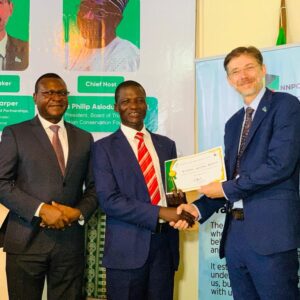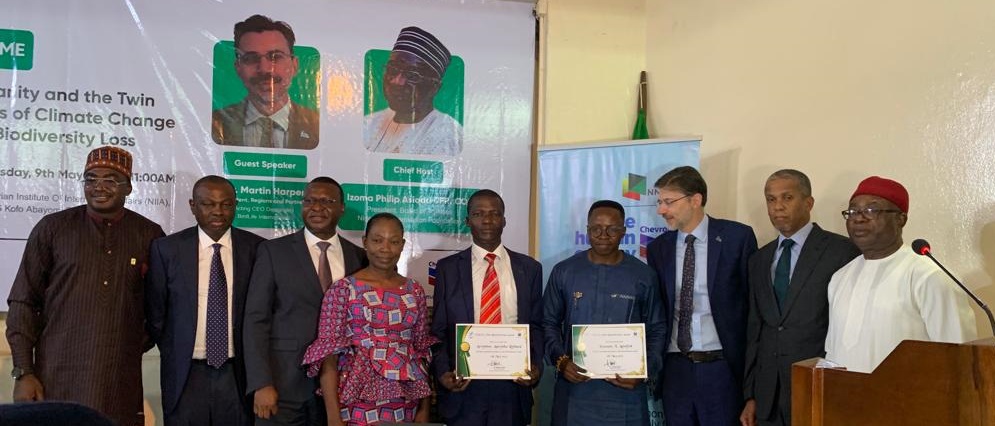Increasing loss of biodiversity and negative impacts of climate change has prompted stakeholders and activists to call for partnerships and concerted efforts to combat biodiversity loss.
This call was made earlier today in Lagos at the Chief S.L Edu 21st Memorial Lecture organized by the Nigerian Conservation Foundation (NCF) with the theme: Humanity and the Twin Crises of Climate Change and Biodiversity Loss.
During the lecture, it was disclosed that
* Over 49percent of bird species worldwide are in decline
* In Nigeria, 70percent of bird species are in decline
* Since 1970, North America has approximately lost 2.9million birds
* The European Union is estimated to have lost 600million birds since 1980
These declines matter as birds are a signpost of biodiversity loss. A healthy biosphere underpins the economy; as forests, rivers, oceans and soils provide us with the food we eat, the air we breathe, the water we irrigate our crops with contributing to health, happiness and prosperity.
Chief Ede Dafinone, Chairman of the National Executive Council of NCF lamented that “Our planet’s biodiversity is in crisis and declining at a faster and unprecedented rate than at any other time in human history. Wildlife is disappearing from their natural habitats and species are being decimated and becoming extinct at an alarming rate due to unsustainable utilization and destruction of wildlife habitats by humans”.
“The devastation that climate change is causing and will continue to cause means that large scale action is required immediately. Desertification, herder-farmer clashes, drought, etc are few of the climate change crises staring us in the face”.
However, inspite of the ‘doom and gloom’, expressing lots of hope and optimism, Mr Martin Harper, the Guest Speaker and Incidentally, acting Chief Executive Designate of Birdlife International, stated that over the years, there had been an amazing sequence of success stories which has given hope to the fact that humanity can indeed mitigate against climate change and biodiversity loss, if concerted efforts and the right strategies are put in place.
Mr Harper stated that, yes, there were a lot of outstanding issues such as intensive heat wave and fires in the Mediterranean, the worst recorded drought in the horn of Africa, and terrible floods around the world, such as seen in Pakistan.

But there needs to be some focus on highlighting the solutions that are working, such as increasing forest coverage, increased participation from private organizations and government as well as increased funding.
These, according to Mr Harper, will provide a successful context that governments, advocates and scientists could work on. He also emphasized that collectively, the world needs to decarbonize to stand any chance of limiting global temperatures to 1.5degrees celcius.
According to Mr Harper, these success stories do not signify that all is well or that humanity has crossed the curve, but only shows that success can be achieved if there can be delivered an integrated response to the nature and climate emergency, globally.
However, the Federal Government of Nigeria is fully committed towards ensuring that it’s no more business as usual as the national climate change act has provided the legal instruments to harmonize and embed full scale mitigation efforts across the country.
Making this assertion at the Lecture, Hon. Samuel Onuigbo, Member of the House Committee on Environment, emphasized that despite the skepticism associated with law enforcement in Nigeria, this particular law ‘will bite’, as the commission is not under any ministry but is being chaired by Mr President with the Director General of the Commission reporting directly to him.
A major factor for increasing climate change and biodiversity loss, according to Dr Joseph Onoja, is a lack of awareness of the impact of human interactions on the environment.
Dr Onoja, the Director General of the Nigerian Conservation Foundation, reiterated the co-dependency of climate change and biodiversity, stating that whatever affects one affects the other; and any solution for one, invariably provides a solution for the other.
Citing forests as a major panacea to climate change, Dr Onoja emphasized their importance, stating that forests are possibly the repositories for the highest number of different species of living organisms. So if one is preventing deforestation, then biodiversity loss is prevented which also helps in climate change mitigation. But if forests are cut down, then more avenues for climate change is provided, the heat index will keep rising, carbon already stored will be released.

Wrapping up the lecture, the Chief S.L Edu Annual Research Grant, sponsored by Chevron Nigeria Limited (CNL) was awarded to two recipients, Mr Inuam Aniefiok and Mr Aroyehun Adeyinka Richard.
Commending the recipients, the General Manager, Policy, Government and Public Affairs of Chevron, Mr Esimaje Brikinn, posited that Chevron is fully committed to continuous sponsorship of this research grant and conservation efforts in Nigeria.
Participants and stakeholders at the event, which included various secondary schools across Lagos, Conservationists and Captains of Industry, all agreed that concerted efforts need to be made to mitigate against biodiversity loss. Multiple calls were made including;
i. Support for the NCF’s Green Recovery Nigeria (GRN) project to help increase forest cover from 4-7 percent to 25percent by 2047.
ii. For Youths to engage each other, supporting and creating awareness on biodiversity, especially on the nature and importance of birds.
iii. To discover and increase partnerships to scale up efforts towards protecting and restoring the global forest cover.
iv. For climate action, By Governments, By Business and By Everyone; to ensure laws, industry and humans live in harmony with nature.







